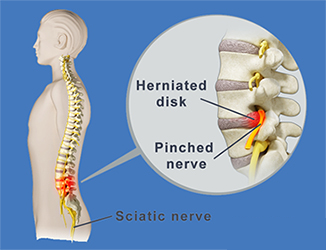Pinched Nerve
What is a Pinched Nerve?

Each year, millions of Americans are affected by a pinched nerve. This nagging sharp pain occurs when a nerve is compressed or pinched. Typically the result of bone or connective tissue causing too much pressure on a nerve. When this pressure to the nerve happens it causes inflammation and aggravates the nerve, which in turn causes pinched nerve pain.
There are many different locations a pinched nerve can affect the body. For example, a herniated disc in the lower spine may put pressure on a nerve root, causing pain that radiates down the back of your leg. It’s normal with rest and additional treatments such as the RICE method (rest, ice, compression & elevation) for the pain to subside within a few days or weeks. However, there are severe cases where surgical intervention is necessary to relieve pain from the pinched nerve.
Causes of a Pinched Nerves
When a pinched nerve occurs it is due to too much pressure being applied to the nerve surrounding tissue of the area of pain. It’s common for this pressure to be a result of repetitive motions. However, sometimes it also happens from holding your body in one position for an extended period of time.
There are many nerves throughout our bodies. However, our nerves most vulnerable at places in your body where they travel through narrow spaces and have little tissue to protect them such as ligaments, tendons, and bones.
For instance, when a nerve root exits the spine inflammation or pressure may occur causing neck or lower back pain. Often the pain will travel (radiate) from the neck into the shoulder and/or arm, which is called radiculopathy. However, when pain radiates into the leg and foot this is often due to pressure on the sciatic nerve.
If nerve compression lasts a long time, a protective barrier around the nerve may break down. Fluid may build-up, which may cause:
- Swelling
- Extra pressure
- Scarring
Therefore, the scarring may interfere with the nerves function.
Pinched Nerve Symptoms
It’s typical when experiencing nerve compression that pain is your only symptom. However, it is possible to have additional symptoms without pain.
Common symptoms of a compressed nerve include:
- Compression pain, such as the neck or low back
- Weakness, especially with certain activities
- Radiating pain, such as sciatica or radicular pain
- Pins and needles
- Burning sensation
- Numbness or tingling
It’s normal for symptoms to worsen when you attempt certain movements, such as turning your head or straining your neck.
Treatments for Pinched Nerves
Depending on each individual person will also determine how long your symptoms might last. Treatment varies depending on the severity and cause of the pinched nerve.
Some people find it helps by simply resting the injured area or by steering clear of activities that seem to worsen your symptoms.
However, if symptoms do not appear to be going away after a few days of conservative care or pain is severe, seek medical attention. It’s common to need more than one type of treatment to shrink the swollen tissue surrounding the nerve.
Some cases can be so severe that it is necessary to remove material that putting pressure on the nerve, such as scar tissue, pieces of bone or disc material.
Treatments:
- Medication: Over-the-counter pain relievers like aspirin and ibuprofen can help fight inflammation. They can ease your pain and lessen swelling. Your doctor may prescribe a stronger drug for pain if necessary.
- Steroid Injections: These injections may reduce swelling and allow inflamed nerves to recover.
- Physical Therapy: Specific movements make the muscles in your neck and back stronger and more flexible.
- Splint: A splint or soft collar limits motion and allows muscles to rest for short periods
- Surgery: If conservative methods do not help with the pinched nerve, sometimes surgery is recommended.
